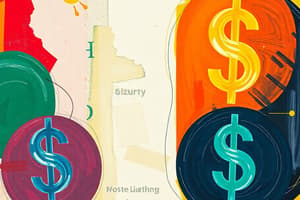Podcast
Questions and Answers
What is the definition of economic cost?
What is the definition of economic cost?
- The value of resources in their best alternative use. (correct)
- The sum of explicit and implicit costs.
- Only the wages paid to workers.
- The total of all monetary payments made by a firm.
Explicit costs are the opportunity costs of using self-owned resources.
Explicit costs are the opportunity costs of using self-owned resources.
False (B)
What are implicit costs?
What are implicit costs?
The opportunity costs of self-owned resources.
A firm incurs explicit costs for _____ services and materials.
A firm incurs explicit costs for _____ services and materials.
Match the following terms with their definitions:
Match the following terms with their definitions:
What is the total sales revenue reported after one year?
What is the total sales revenue reported after one year?
Economic profit includes only explicit costs.
Economic profit includes only explicit costs.
What is the amount of economic profit calculated?
What is the amount of economic profit calculated?
The total (explicit) costs amount to ______.
The total (explicit) costs amount to ______.
Which of the following is considered an implicit cost?
Which of the following is considered an implicit cost?
What is the normal profit considered in business?
What is the normal profit considered in business?
If a firm's total revenue equals its economic costs, it earns economic profit.
If a firm's total revenue equals its economic costs, it earns economic profit.
Flashcards
Economic Costs
Economic Costs
The value of the best alternative use of resources used in production.
Explicit Costs
Explicit Costs
Monetary payments made by a firm to those supplying resources owned by others (e.g., wages, rent, materials).
Implicit Costs
Implicit Costs
Opportunity costs of using a firm's self-owned, self-employed resources.
Opportunity Cost
Opportunity Cost
Signup and view all the flashcards
How do economic costs relate to opportunity?
How do economic costs relate to opportunity?
Signup and view all the flashcards
Accounting Profit
Accounting Profit
Signup and view all the flashcards
Economic Profit
Economic Profit
Signup and view all the flashcards
Normal Profit
Normal Profit
Signup and view all the flashcards
Economic Profit (or Pure Profit)
Economic Profit (or Pure Profit)
Signup and view all the flashcards
What is the significance of economic profit being zero?
What is the significance of economic profit being zero?
Signup and view all the flashcards
What is the meaning of a 'normal profit' being a cost?
What is the meaning of a 'normal profit' being a cost?
Signup and view all the flashcards
Study Notes
Theory of the Firm
- Firms exist due to scarcity of resources and their alternative uses.
- When resources are combined to produce a good, alternative uses are forgone.
- Opportunity cost is the value of the best alternative use of a resource.
Economic Costs and Profit
- Economic Costs: Resources are scarce, productive, and have alternative uses. Using resources to produce one good means forgoing using them for other purposes.
- Opportunity Cost: This is the measure of economic cost. It's the value that a resource would have in its best alternative use.
- Explicit Costs: Monetary payments for resources owned by others. Explicit costs are revealed (cash expenditures). Examples: wages, materials, rent.
- Implicit Costs: Opportunity costs of using self-owned or self-employed resources. Implicit costs are the forgone earnings from the best alternative use of these resources (not always obvious). For example, the income a business owner could earn elsewhere could be considered as an implicit cost.
Example of Explicit and Implicit Costs
- A sales representative earning $22,000 per year decides to open a T-shirt retail store.
- Investment of $20,000 savings that were earning $1,000 per year.
- Rented a store (owned) for $5,000 per year.
- Hired a clerk for $18,000 annually.
Calculating Costs and Profit
- Total Sales Revenue: $120,000
- Explicit Costs (Clerk's salary, Cost of T-shirts, Utilities): $63,000
- Accounting Profit: $57,000
- Implicit Costs (Foregone Interest, Foregone Rent, Foregone Wages, Foregone Entrepreneurial Income): $33,000
- Economic Profit: $24,000
Normal Profit as a Cost
- Normal profit is the minimum payment needed to keep an entrepreneur in a business. It is considered an implicit cost.
- If an entrepreneur doesn't receive enough payment (less than normal profit) ,they might shift to a more profitable endeavor.
Economic Profit
- Economic Profit is total revenue less economic costs. This is the return above what's needed to retain entrepreneurial talent.
- Economic profit is zero if total revenue just covers all explicit and implicit costs, including normal profit.
Accounting Profit vs Economic Profit
- Accounting profit considers only explicit costs (payments to outside providers).
- Economic profit takes into account both explicit and implicit costs (including the opportunity cost of resources the firm already owns).
Studying That Suits You
Use AI to generate personalized quizzes and flashcards to suit your learning preferences.




